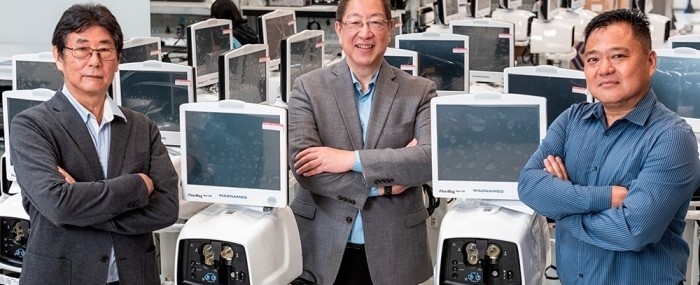
Mechanical ventilator maker supported by FAPESP wins approval to start producing in the United States
13 de junho de 2023Agência FAPESP – In the first week of June, Magnamed, a Brazilian maker of pulmonary ventilators founded in São Paulo in 2005, received permission from the United States Food and Drug Administration (FDA) to operate a manufacturing plant in Florida.
Magnamed’s portable emergency ventilator, OxyMag, was developed with funding from FAPESP’s Innovative Research in Small Business Program (PIPE) between 2006 and 2012.
It embarked on the rigorous US certification process in 2019 but had to wait longer than usual because of the COVID-19 pandemic. This successful conclusion makes Magnamed the first Brazilian manufacturer of mechanical ventilators in the American market. To achieve certification, the company invested over USD 1 million in laboratories, travel, consultants, prototypes, and a pilot production line. It is now setting up a sales force and customer care team.
Production in the US is expected to begin in 2024, as soon as the new plant, leased in 2023 in Florida, is ready to operate. The company plans to produce 100 units of the OxyMag ventilator per month, focusing on the US market. The global market is estimated to be worth USD 5.7 billion per year, with the US accounting for about 20%.
“We’re very pleased to have won approval, for which we fought for a long time. We’re proud to be the first Brazilian company to achieve this type of certification in the US. We hope it will be the first of many such victories, and that the new plant can show the world we produce real innovation in the medical-hospital sector,” said Wataru Ueda, Magnamed’s founding partner and CEO.
The company won the European Union’s regulatory approval in 2010. It exports 30% of its output, with the private market in Brazil taking 40% and the public sector accounting for 30%. Following US approval, it will operate in practically all markets.
It aims to build exports by 2026 to 80%, or BRL 180 million (now about USD 38 million). For this to happen, however, it must have internationally certified products. It has exported to 81 countries to date.
Increase in competitiveness
Export earnings are important for the company, but they also make a key contribution to its competitiveness, according to Ueda. “We need to win several international certifications both for the product and for our manufacturing and quality assurance processes. The Brazilian market is fully open in this sector, requiring constant technological improvements if the company is to remain competitive. From this standpoint, nothing is better than to compete in the global arena,” he said.
Mechanical ventilators last about seven years in the US, and ten years in the rest of the world. Magnamed’s US plant will increase demand for new machines. Countries are also concerned to rebuild inventories of ventilators following the pandemic, and there is plenty of scope for local production around the globe.
“We’re partnering with companies in India and Mexico, among others, to build local production capacity. We supply technology and know-how so that they don’t depend so much on imports,” Ueda said.
Constant innovation
In November 2022, Magnamed announced the launch of an innovative ventilator monitoring system based on respiratory muscle pressure (PMUS). The solution, whose development began in 2017, uses artificial intelligence and machine learning to solve problems of patient-ventilator asynchrony. The company invested BRL 4 million in research and development using tax incentives available under Brazil’s Lei de Informática, a law enacted in 1990 for the IT, automation and telecommunications industries.
The new system may soon revolutionize production of this kind of equipment globally. A small hardware component and software based on machine learning algorithms solve a problem that other producers currently address invasively, introducing a balloon catheter or electrodes into the esophagus for respiratory monitoring.
Magnamed worked with physicians to develop its solution by analyzing data to understand the effort made by the respiratory muscles. The machine “learns” to calculate muscle pressure and decides whether the ventilator is in synchrony with the patient’s spontaneous breathing. To do so, it gauges the negative pressure (PMUS) created by the diaphragm during inspiration, which existing devices measure invasively.
Expansion
Founded in 2005 by engineers Wataru Ueda, Tatsuo Suzuki and Toru Miyagi, in 2008 Magnamed received its first injection of capital from BNDES, Brazil’s national development bank, via Criatec, a fund that invests in innovative companies in IT, biotech, new materials, nanotech and agribusiness, among other sectors. The fund is managed by KPTL.
The startup was incubated at the Center for Innovation, Entrepreneurship and Technology, run by the University of São Paulo (USP) and the Nuclear and Energy Research Institute (IPEN). In 2015, it received a second injection from Vox Capital, a social impact fund. Criatec and Vox Capital together own 54% of the company. They also take part in governance, according to Magnamed’s senior executives.
Expansion occurred in 2020 when demand for its ventilators surged owing to the effects of the pandemic on health services. To ramp up production quickly, Ueda sought help from his network of former fellow students at the Aeronautical Technology Institute (ITA), such as Walter Schalka, CEO of Suzano, one of the world’s leading pulp and paper markers. Other Brazilian industrial heavyweights, such as aircraft manufacturer Embraer, joined in, and production expanded accordingly. The firm grew swiftly and became a leading player in the global ventilator market as a result (read more at: pesquisaparainovacao.fapesp.br/1356).
